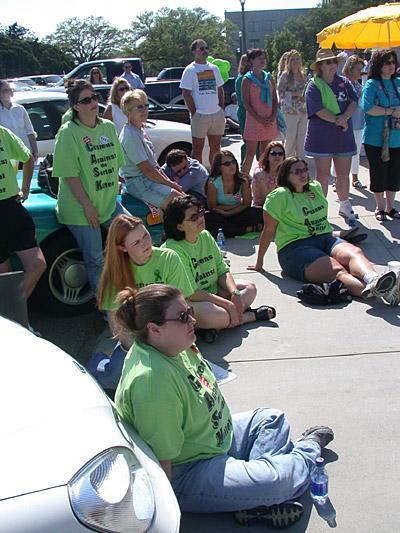As onlookers watched and listened, emotions festering, thoughts of why more University students are not present at such an event cross some people’s minds.
Geri Teasley, co-organizer of the Justice for All Rally for the Victims monthly rallies, said she hoped more LSU students would have showed up Sunday afternoon on the steps of the state capitol building.
One student who attended the rally, Andria Waggenspack, a part-time business administration graduate student, stood with her mother, Vickie, with a sign remembering Andria’s best friend’s mother, Connie Warner, whose body was found in 1992.
She said students, especially female students, are nervous about attending rallies because many suspect the serial killer attends some of these types of events.
Waggenspack said when she was invited to attend a banquet for Charlotte Murray Pace, she was informed undercover police were expected to be there in case the serial killer showed up.
She said there needs to be a connection from the city to campus to make students aware.
“Maybe students would learn something because it’s getting too quiet,” Waggenspack said.
Dwaine Mouton, serial killer victim Treneisha Dene Colomb’s cousin, spoke at the rally and expressed his concerns about how quiet the serial killer has been.
“It’s too quiet now,” he said. “It’s always quiet before the storm. When lightning strikes, you never know.”
John Pritchett, son of Mari Ann Fowler, the 65-year-old missing since Dec. 24, said it is a shame the only thing bringing the families of the victims together to the rally is death.
He said he is disillusioned by Gov. Mike Foster’s attempt to justify new lights on the Mississippi River bridge to make Baton Rouge more attractive to prospective LSU students when Foster said there is not enough money to have professionals answer the serial killer hotline phones.
“I don’t want competent; I want professional,” Pritchett said.
He said investing the most amount of money possible to catch the serial killer would be the best way to make Baton Rouge more attractive to prospective LSU students.
He said there is no deterrent for people who commit crimes like this.
“We want the punishment to fit the crime,” he said. “I want him to say John Pritchett will beat me to death on the steps of the capitol building with a ball-peen hammer. And I’ll do it every day of the week.”
Gubernatorial candidate Buddy Leach attended the rally, saying his talk was not political but personal because he is Fowler’s friend.
He said Foster is saying money is no object in the serial killer case.
“If money is no object, then spend it and spend it now,” Leach said. “This is homeland security; this is bioterrorism.”
After the rally, Teasley said she does not know if she will be able to encourage more student attendance.
Her husband suggested making a list of the future rallies and posting them in residence halls and getting sororities, fraternities and other student organizations involved in the rallies.
Teasley said she is considering planning a rally on campus similar to Sunday’s rally with the victims’ families in the fall because more new people will be attending LSU.
She said when Carrie Yoder was murdered, something happened to the community.
“People were pissed,” she said. “It inspired anger, a powerful emotion.”
Ann Pace, Charlotte Murray Pace’s mother, said the college-age crowd is the hardest to convince that they are in danger.
“Part of being young is daring to do the things the young do,” Pace said. “They have a sense of invincibility.”
She said when Gina Wilson Green was murdered down the street from Charlotte, she called her mother, and they had a discussion about safety.
“I never thought they’d end up being connected,” Pace said.
She said Yoder’s family talked with Carrie about safety, but never thought anything would actually happen to her.
Seeking student support
April 28, 2003

Seeking student support




